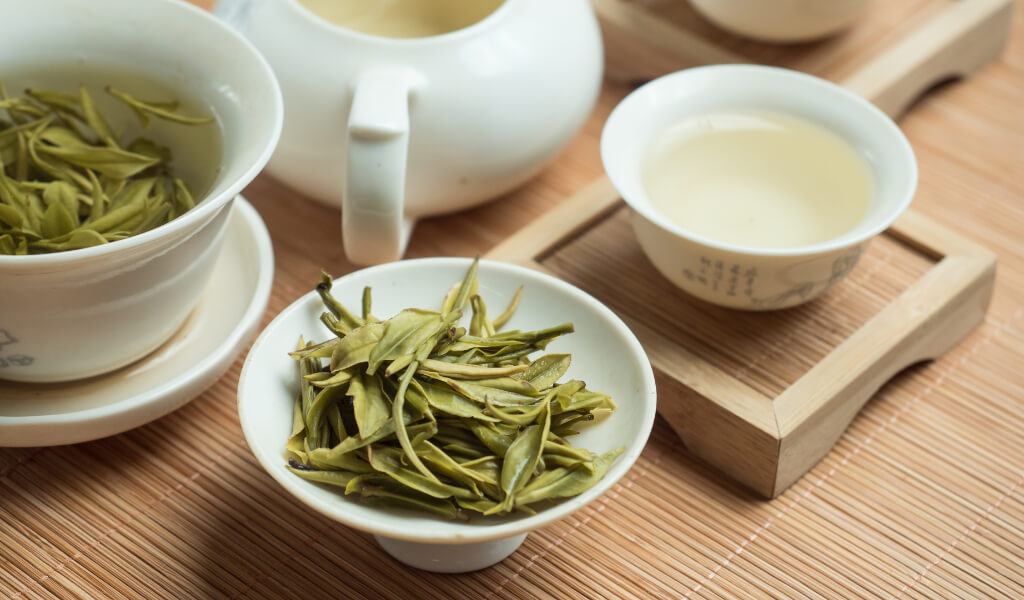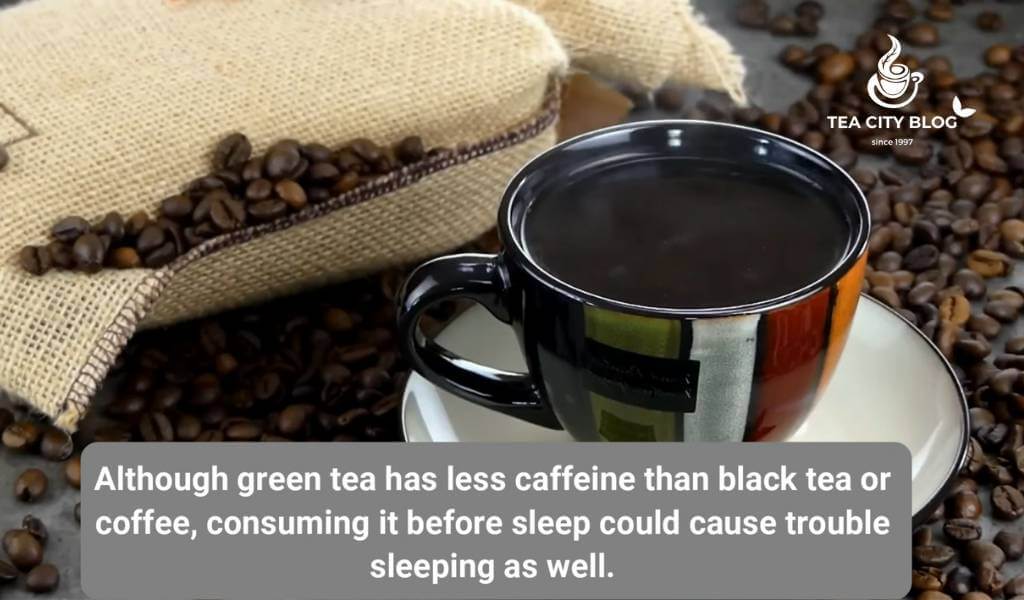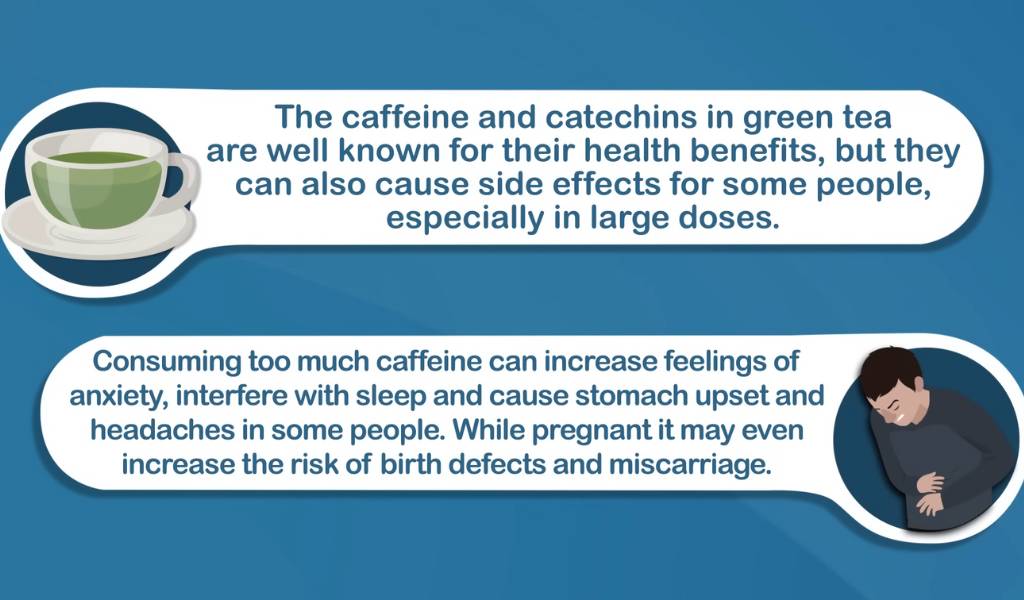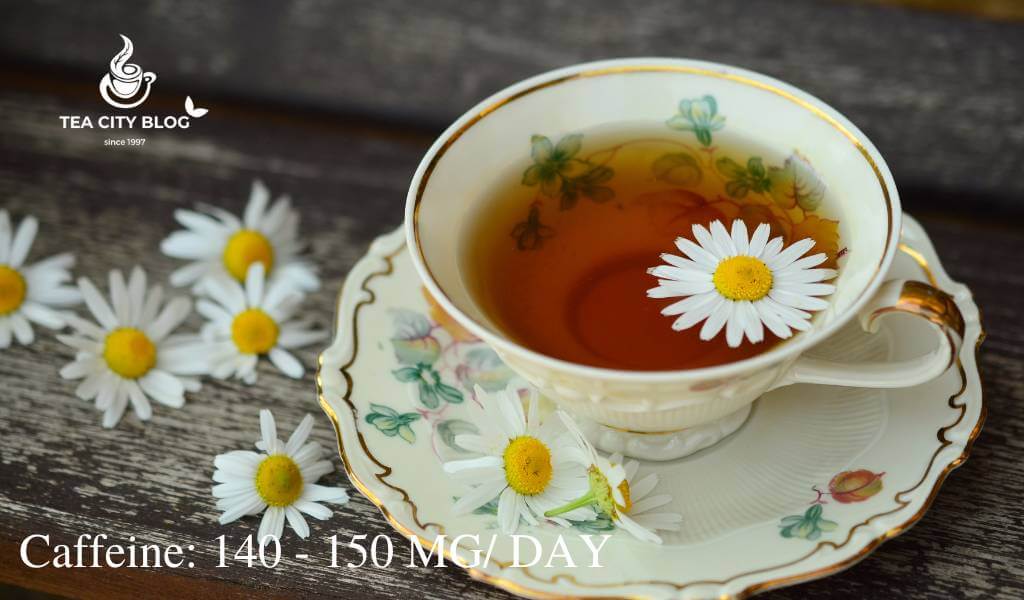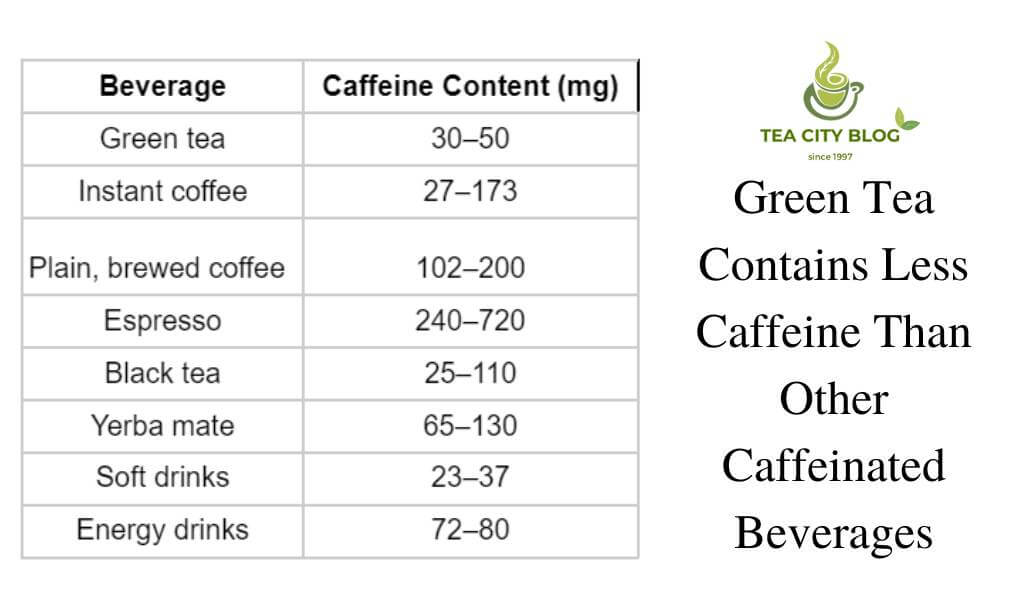I enjoy drinking Green tea since it tastes delicious and has several health advantages. Studies have shown that the best green tea may improve brain function and help slow down brain aging. It may also lower the risk of heart disease, type 2 diabetes, and cancer.
However, I know that Green tea contains caffeine, like regular tea. If you want to limit your caffeine intake, this can be a concern.
So, in this article, I’ll explore how much Caffeine in a cup of Green Tea and compare it to other caffeinated drinks.
Quotes of tea at Today
“While her lips talked culture, her heart was planning to invite him to tea”
― E.M. Forster, Howards End
How much Caffeine in a cup of Green Tea?
Indeed, the average amount of caffeine in an 8-oz (230-ml) serving of Green tea is about 35 mg. However, this can vary between 30 and 50 mg depending on a few factors. Since the caffeine in Green tea is natural, it depends on the type of tea plant, its growing conditions, and how it’s processed and brewed.
For instance, older leaves tend to have less caffeine than younger leaves. Also, bagged teas usually have more caffeine than loose-leaf teas, possibly because the tea leaves in bags are crushed. Powdered green teas, such as matcha or chocolate, contain even more caffeine than bagged and loose Green tea, but their portions are small.
If you’re concerned about the caffeine in your drink, pay attention to how you prepare it. The longer you brew your tea and the hotter the water, the more caffeine it’ll have. If you’re looking for a lower caffeine content, go for older leaves and loose-leaf tea, and try brewing it for a shorter time with cooler water.
Summed: Green tea typically contains 30 to 50 milligrams of caffeine per 8-ounce cup. However, the powdered form of Green tea, such as matcha, has a higher caffeine content than loose leaf or tea bags.
Is there caffeine in green tea?
Like black, white, and Oolong tea, Green tea has caffeine that occurs naturally. However, the caffeine in cup of Green tea is slightly lower than what you would typically find in black tea and significantly less than a cup of coffee.
When I’m brewing my Green tea, the caffeine content can be influenced by various factors. For instance, the timing of the tea leaf harvest can impact how much caffeine is present.
If the leaves are picked earlier, they may have a higher caffeine content than later crops. As tea leaves oxidize more over time, they contain fewer polyphenols to bind with caffeine, which can decrease their absorption.
The way I brew my tea can also impact caffeine levels. Cold-brewing my tea tends to extract less caffeine than hot-brewing. But the even more important question is how long to steep green tea? The time I steep my tea can also have an effect. In particular, if I steep my Green tea for 5 minutes rather than 15 minutes, it could come with lower caffeine content and softer flavor.
– Which green tea has no caffeine?
- FGO Organic Healthy Caffeine-Free Green Tea, available in a 100-count package.
- Stash Certified Non-GMO Caffeine-Free Green Tea, also available in a 100-count package.
- Allegro Organic Ultra-Mellow Caffeine-Free Green Tea, available in a 20-count package.
- Bigelow Tea has Individually Wrapped Caffeine-Free Green Tea, available in a 120-count package. Enjoy a delicious cup of Green tea without caffeine!
What Is Caffeine and What Does It Do?
Caffeine is a naturally occurring chemical in over 60 plants, including tea leaves, decaf coffee beans, and various fruits. People worldwide consume caffeine to increase their alertness and fight off tiredness.
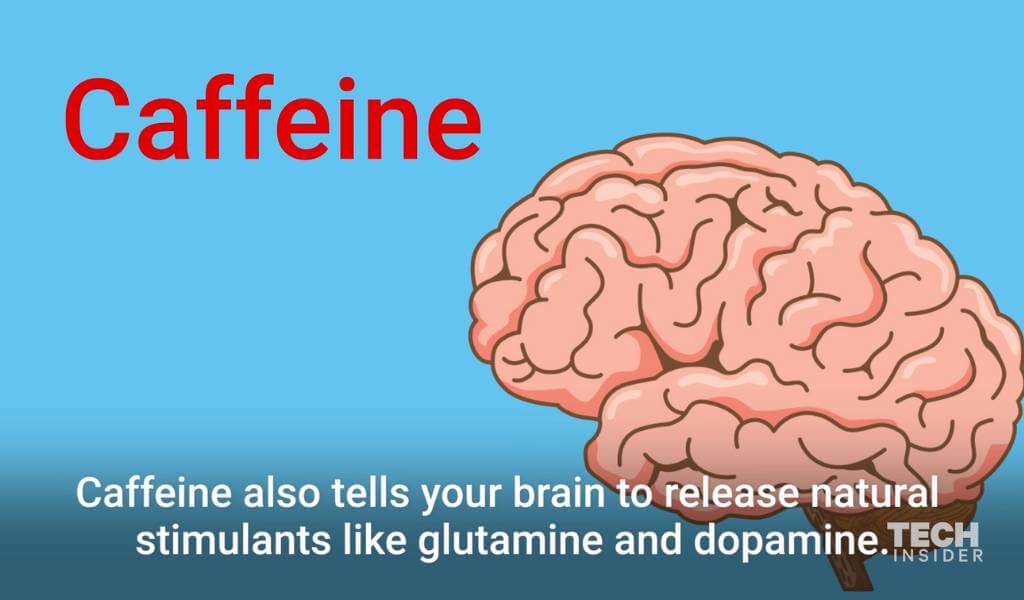
Caffeine consumption jumpstarts your central nervous system by countering the impact of adenosine, a neurotransmitter that accumulates over time and induces drowsiness.
Caffeine has been linked to various health advantages, including improved mood and brain function, increased metabolism, and improved athletic performance.
It affects everyone differently, but too much might induce restlessness, sleeplessness, or an irregular heartbeat, especially in sensitive patients.
Summed: Caffeine, a natural stimulant, can aid in promoting alertness and wakefulness. It use has also been linked to possible health benefits such as improved cognitive performance.
Green Tea Showdown: Which Type Packs the Most Caffeine?
Have you ever wondered how much caffeine is in different types of green tea?
The amount of caffeine primarily depends on the steeping temperature and the amount of Green tea used. For example, suppose you steep three to four grams of Green tea in 100 milliliters of water at 60 degrees Celsius. In that case, the following caffeine content is achieved:
- Matcha has around 250 mg of caffeine per 100 ml of tea
- Gyokuro has about 60 mg of caffeine per 100 ml of tea
- Gunpowder has about 40 mg of caffeine per 100 ml of tea
- Sencha has about 30 mg of caffeine per 100 ml of tea
Some Green tea varieties, however, have significantly less caffeine. For instance:
- Genmaicha has about 20 mg of caffeine per 100 ml of tea
- Kukicha has about 10 mg of caffeine per 100 ml of tea
- Sannenbancha has about 5 mg of caffeine per 100 ml of tea
To put things into perspective, here are the caffeine contents of a few other popular drinks:
- Red Bull has around 30 mg of caffeine per 100 ml
- Coffee has about 40 mg of caffeine per 100 ml
- Club Mate has about 20 mg of caffeine per 100 ml
The more potent Green tea varieties contain significantly more caffeine than some commercial energy drinks like Red Bull.
In Germany, regulations limit the maximum caffeine content to 32 mg per 100 ml of beverage in fruit juice, fruit nectar, caffeinated soft drinks, and herbal and fruit tea for infants and young children.
Caffeine and Theine: Java Jitters or Tea Time?
Is there a difference between caffeine and theine when we talk about Green tea? The answer is no.
There isn’t any difference other than the way the words are spelled. That’s because the chemical structure of caffeine and theine is precisely the same. Nowadays, people use the term “tein” less and less.
However, there is a difference in how our bodies absorb caffeine from coffee and tea. When you pour water into tea, the caffeine binds to tannins, a process that continues during steeping. The longer the tea steeps, the more tannins are released, securing more Green tea caffeine per 100ml.
Before your body can absorb the caffeine, it has to be removed from the tannins. This means it takes some time for the caffeine to enter your body. In contrast, coffee has fewer tannins than Green tea, so the caffeine inside is absorbed into the body immediately.
In summary, the caffeine in coffee is absorbed and processed faster by the body, resulting in a more potent caffeine boost. On the other hand, the caffeine in tea is processed more slowly, leading to a less intense but longer-lasting caffeine boost.
Tips for Reducing Caffeine in Your Green Tea
Looking to cut down on the caffeine in your Green tea? No problem, we’ve got some helpful tips for you:
- Skip the Green tea drinks from coffee shops like Starbucks and Caribou. They tend to have more caffeine than other green tea drinks.
- Go for decaf green tea instead. Remember that decaf Green teas still contain caffeine but less than regular Green teas.
- Try drinking blended Green teas, like a mix of Green tea with lemongrass or mint. These typically have less caffeine than unblended green teas.
- Don’t try decaffeinating your tea at home; it’s a myth.
- Brew your Green tea correctly. Don’t use boiling water or steep it for too long, as this increases the caffeine level in your cup. Instead, use simmering water and brew for 30 seconds to 4 minutes, depending on the type of Green tea.
- Opt for loose-leaf Green tea instead of tea bags, as tea bags have more caffeine.
- Choose Green teas made from older, more mature leaves instead of tea buds or “tips,” which tend to have more caffeine.
- Consider trying “twig teas” made from the stems of the tea plant. These are naturally low in caffeine.
- Avoid shade-grown Green teas like Matcha and Gyokuro, which are naturally high in caffeine.
If you want a caffeine-free option with a similar flavor to Green tea, try an herbal tea/tisane like jiaogulan, green rooibos, or lemon balm.
How Much Caffeine Should I Consume In a Day?
The Mayo Clinic recommends that adults limit caffeine intake to about 16 cups of Green tea. But, how much caffeine is in a cup of Green tea?
According to my brewing experience, an average cup can be available for 30 milligrams. In other words, you should only use less than 400 micrograms per day for healthy Green tea benefits.
Many people wake up in the morning craving caffeine boosts to kick-start their day, while others turn to coffee shops for an afternoon pick-me-up during the typical “midday slump.”
Caffeine can be a part of a healthy eating pattern for most people, but too much can lead to health problems. Accordingly, the safe amount differs among individuals based on weight, medication use, and personal tolerance.
According to the FDA, healthy adults can consume up to 400 milligrams of caffeine daily, equivalent to about 5 cups of coffee or 10 cups of Green tea. This amount is generally safe and shouldn’t cause any adverse effects. Nevertheless, caffeine affects individuals differently, and excessive consumption may result in jitteriness, anxiety, headaches, nausea, insomnia, or an accelerated heart rate for someone.
It’s essential for individuals to determine their caffeine intake levels and to be mindful of how their body reacts to different amounts of caffeine.
By listening to your body and being aware of any adverse effects, you can enjoy the benefits of caffeine without overdoing it.
Read More: When is the best time to drink green tea?
Sip Smart: Green Tea’s Low Caffeine Content
Below are the caffeine amounts in 8 fluid ounces (230 milliliters) of several common beverages, allowing you to compare their caffeine content:
|
Beverage |
Caffeine Content (mg) |
|
Green tea |
30–50 |
| Instant coffee |
27–173 |
|
Plain, brewed coffee |
102–200 |
| Espresso |
240–720 |
|
Black tea |
25–110 |
| Yerba mate |
65–130 |
|
Soft drinks |
23–37 |
| Energy drinks |
72–80 |
As I observed, other caffeinated drinks typically have a much higher caffeine content per 8 ounces than Green tea. Black tea has around 55 mg of caffeine per 8 ounces, while brewed coffee has about 100 mg.
Many rich green tea recipes also contain an amino acid called L-theanine, which has been found to have a synergistic effect with caffeine. This means that even though Green tea has a lower caffeine content (about 19 mg per 8 ounces), you can still get a different and milder buzz than coffee.
Also, L-theanine and caffeine in Green tea have been shown to enhance alertness and focus, which makes it a better choice than coffee for tasks that require a lot of thinking.
Summed: Compared to brewed coffee and other caffeinated beverages such as black tea, soft drinks, and energy drinks, Green tea typically contains approximately half the caffeine.
Green Tea’s Caffeine Kick: Harmless or Hazardous?
Caffeine is a popular stimulant that many people consume safely in recommended amounts.
For adults 19 years and older, it’s considered safe to have around 400 mg of caffeine per day, roughly 2.7 mg per pound (6 mg per kg) of body weight. However, avoiding negative effects is a good idea by limiting your caffeine intake to about 200 mg at a time.
To put this into perspective, four 8-ounce Green tea contain approximately 200 mg of caffeine. So, enjoying a single 8-ounce Green tea will be within those limits.
Compared to other caffeinated drinks, Green tea has a lower caffeine content. As long as you stick to these recommended limits, there’s no need to worry about the caffeine in Green tea.
Steeping Science: Uncovering the Impact of Time on Green Tea’s Caffeine Content
Have you ever wondered if steeping time affects the caffeine content of Green tea? Well, the amount of caffeine in your cup of Green tea depends on several factors, including steeping time, water temperature, and the number of infusions.
Studies have shown that up to 85 percent of the caffeine in tea leaves can dissolve in water. With a brewing time of two minutes and a water temperature of 60 degrees Celsius, about 20 percent of the caffeine in Green tea is released.
If you want to increase the caffeine content, you could try steeping the tea for longer. However, be careful not to soak it too long, as this can make the tea bitter. This happens because too many tannins from the tea leaves dissolve in the water.
If you’re looking for a way to increase the caffeine content of your Green tea, try steeping it for a bit longer, but not too long!
Going Caffeine-Free with Green Tea: Exploring Alternative Blends
These are perfect for people who love the taste of Green tea but want to avoid caffeine. The “Green Method” is used to produce decaffeinated Green tea. Carbon dioxide is used to dissolve the caffeine chemically.
However, decaffeinated Green tea loses many of its health benefits because most of the polyphenols are disrupted. Consumers also report that the taste and aroma of decaffeinated Green tea are better than regular Green tea.
Thankfully, there’s an alternative to decaffeinated Green tea. Madura Green tea from Australia naturally has shallow caffeine content. So, you want to enjoy green tea’s taste and health benefits without caffeine. In that case, Madura Green tea is a great option to consider.
Green Tea and Caffeine Sensitivity: Finding Solutions for Your Tea Troubles
Green tea has fantastic health benefits that can help reduce caffeine sensitivity over time if consumed properly.
Unlike coffee, Green tea is not addictive and won’t cause withdrawal symptoms. Yet, lower your dosage and choose the best time to drink green tea in a day if you experience adverse effects.
Drinking fresh still water before or after drinking Green tea is also essential. If you’re sensitive to caffeine, drinking at least as much water as Green tea is recommended.
In conclusion
The caffeine content of Green tea can vary depending on factors such as the type of tea, the brewing time and temperature, and the serving size.
While Green tea generally contains less caffeine than coffee, it can still provide an energy boost and other potential health benefits.
Whether you’re sipping a hot cup of Green tea to start your day or enjoying a refreshing iced tea in the afternoon, remember to savor the flavor and enjoy the potential perks of this beloved beverage.
Don’t hesitate to explore different types of Green tea and experiment with brewing methods to find your perfect cup.
Start incorporating Green tea into your daily routine and experience the benefits for yourself.
Thanks for spiriteadrinks.com
FAQs
Is green tea very high in caffeine?
Regarding caffeine content, Green tea is relatively low compared to drinks like black tea and coffee. So, if you’re watching your caffeine intake, choosing Green tea can give you a gentle energy boost without making you feel jittery.
Which has more caffeine: coffee or green tea?
I’ve noticed that coffee has much more caffeine than Green tea. A regular 8-ounce cup of Green tea usually has 30 to 50 milligrams of caffeine, while an 8-ounce cup of coffee contains about 80 to 100 milligrams of caffeine.
Does green tea dehydrate you?
Drinks containing caffeine, such as natural diuretics, can cause your body to lose water. If you drink too much Green tea, you may peep a lot and become dehydrated.
How much caffeine is in a single bag of Green tea?
Green tea typically contains 30-40mg of caffeine per cup, assuming 200 ml of water is used. Determining an exact caffeine content is a complex process, as it can vary based on factors such as growing conditions, processing methods, and brewing techniques.
Does decaffeinated Green tea still contain EGCG?
That’s an excellent question. It would appear that it depends on the process used to decaffeinate the tea leaf. I usually only speak to matcha questions, but I was curious about the answer because one of our matcha growers asked if we were interested in decaf matcha.
Is decaf Green tea just as beneficial for your health?
Yes- it is as healthy and not due to caffeine. Green tea and other teas from the camellia sinensis plant have health benefits thanks to their antioxidants and theanine, which can help regulate mood. It should be noted that the theanine content neutralizes caffeine’s stimulant effect- accounting for tea’s overall calming effect regardless of its caffeine content.
Can decaffeinated Green tea help you lose weight?
Only if you drink it as a substitute for sugary drinks, you just have to eat good food with plenty of vegetables and fruit, don’t overeat, and get plenty of exercise. No magic potions.
Does Green tea provide a stimulating effect?
Caffeine in a cup of Green tea does not stimulate but promotes concentration and increases performance.
I’m Shanna, creator of Spiritea Drinks. I’m all about teaching people to grow their own food, tea, cook what they harvest, and eat with the seasons.

